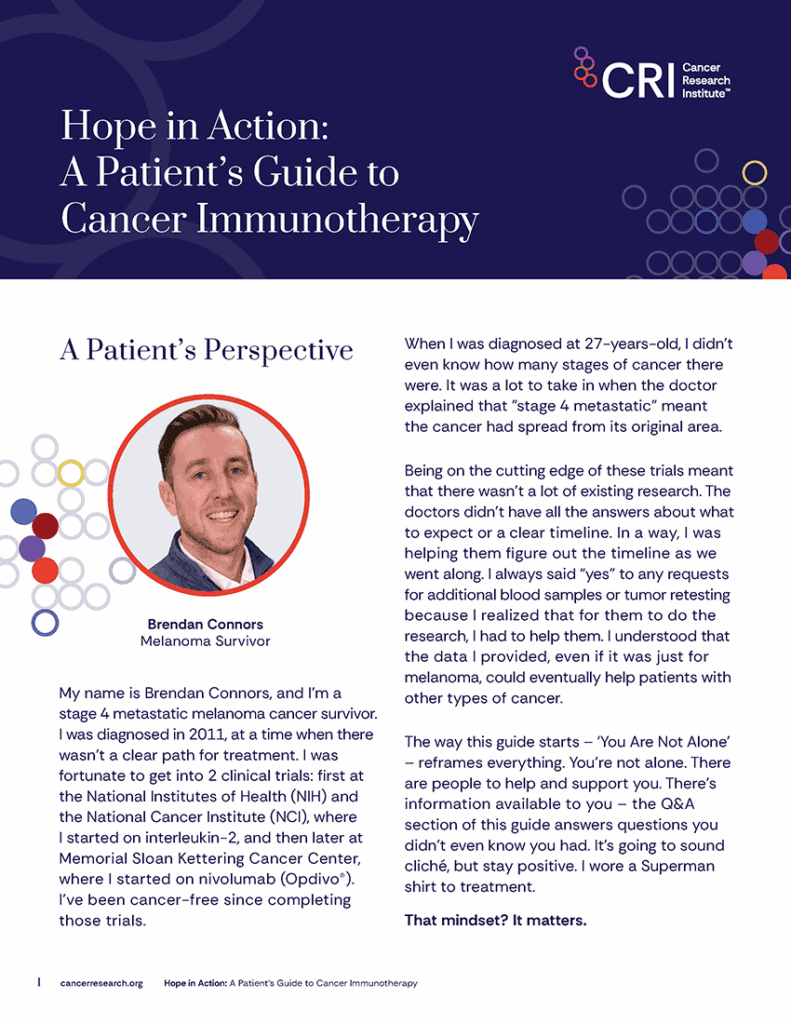At the Cancer Research Institute (CRI), we know that the moment a person hears “you have cancer,” everything changes. However, what comes next—fear or hope, isolation or connection—can depend on access to something powerful: information.
This is where CRI’s mission and vision for a future immune to cancer intercedes. We accelerate life-saving immunotherapy research and empower patients with the knowledge to navigate it. We know that science alone isn’t enough and that patients need tools, guidance, and community.
For Karen, Tom, and Brendan—three patients diagnosed with advanced stage 4 cancers—those questions were not theoretical. They were urgent. Life-defining. In the face of that fear, they chose to fight, not just with treatments, but with knowledge, self-advocacy, and hope. Their powerful stories, shared in CRI’s recent Patient Roundtable, are reminders that the path forward doesn’t always start with certainty—it starts with connection.
Karen found a clinical trial when options were running out. Tom navigated his aggressive cancer diagnosis by asking questions until he found an approach that made sense for his body. Brendan went from a devastating prognosis to a renewed life through immunotherapy and now advocates for others walking the same path.
Every cancer diagnosis is different. But, Karen, Tom, and Brendan each shared a common shield in their cancer battle: information.
That’s why CRI’s Patient Guide to Cancer Immunotherapy exists. This isn’t just a document; it’s a lifeline. This guide was created with patients like Karen, Tom, and Brendan in mind: people trying to understand their options, navigate clinical trials, and make deeply personal treatment decisions in a world that often feels impersonal.

Hope in Action: A Patient’s Guide to Cancer Immunotherapy is a clear, compassionate resource designed for anyone impacted by cancer—patients, caregivers, and loved ones alike. It explains what immunotherapy is, how it works, what to expect during treatment, and how to get support every step of the way.
This guide offers clear, compassionate explanations of how immunotherapy works, what side effects might look like, and how to talk to a doctor about whether this approach could be right for you or someone you care about. It breaks down complex science into plain language and helps you become a more informed, active participant in the cancer care journey.
Information alone isn’t enough. As Karen says in the roundtable, “You have to advocate for yourself. No one knows your body better than you.” And as Brendan reminds us, “There are real people behind every diagnosis.” These insights are hard-won, born from personal trials, but they offer something universal: the understanding that community, compassion, and curiosity can be as healing as medicine.
At CRI, we believe that science saves lives—and that sharing knowledge and lived experiences helps others find their way. By combining cutting-edge research with the voices of those impacted by cancer, we can reach patients not just with treatments, but with understanding, support, and hope.
If you or someone you love is facing cancer, know this: you are not alone. There is a global community working tirelessly to advance treatments. There are researchers decoding the immune system’s secrets. And there are survivors like Karen, Tom, and Brendan lighting the way.
Explore the guide. Watch their stories. Ask the next question. Because the first step toward healing often begins with understanding—and the next with courage.
